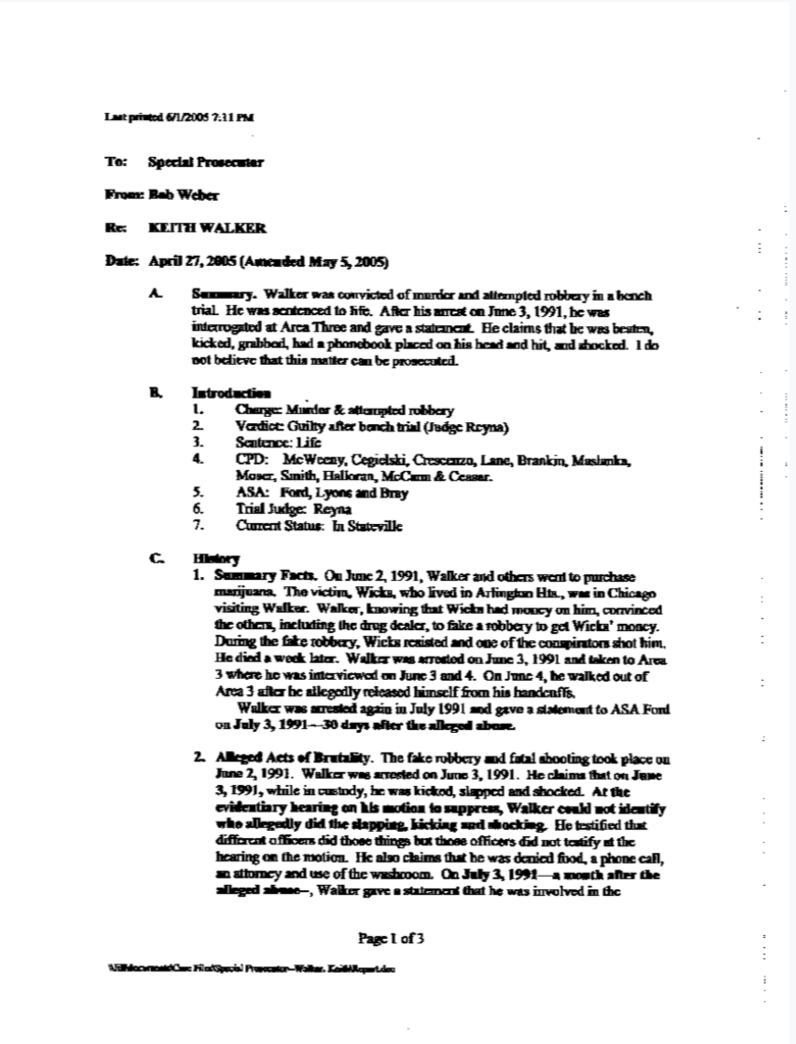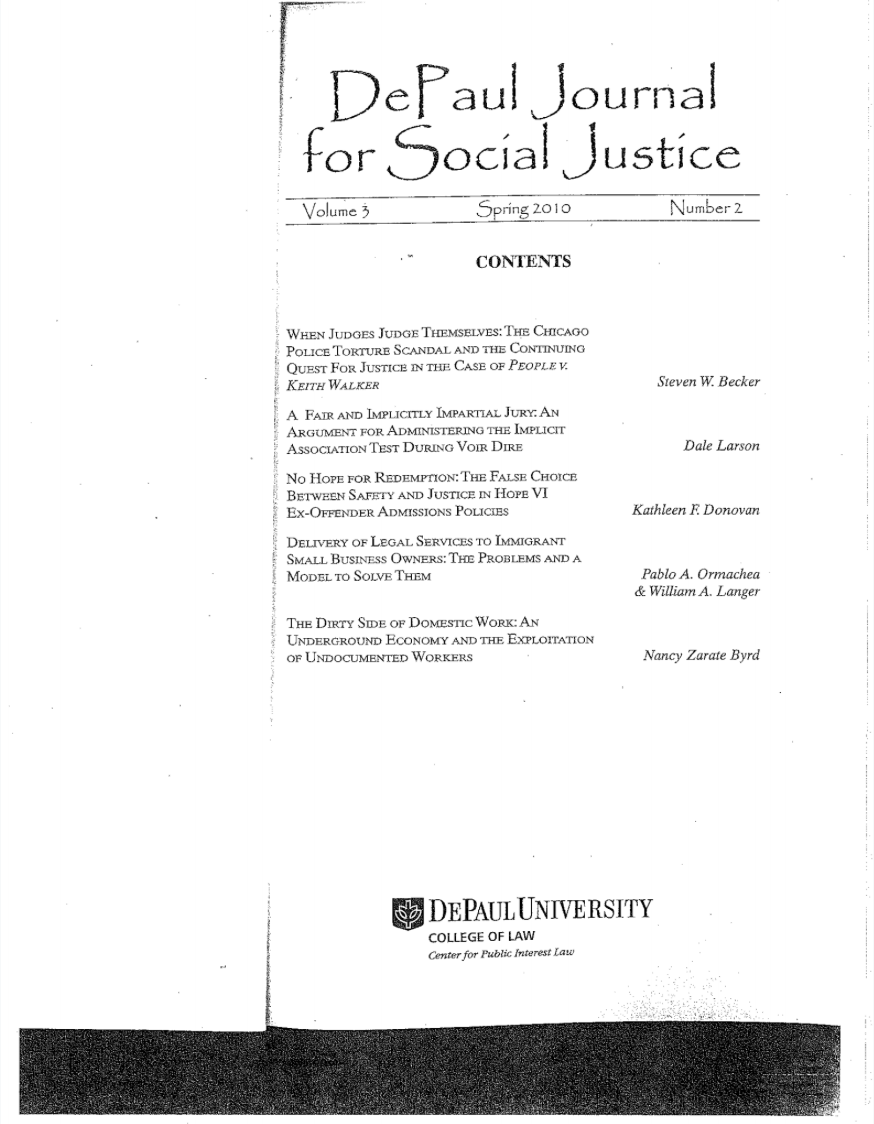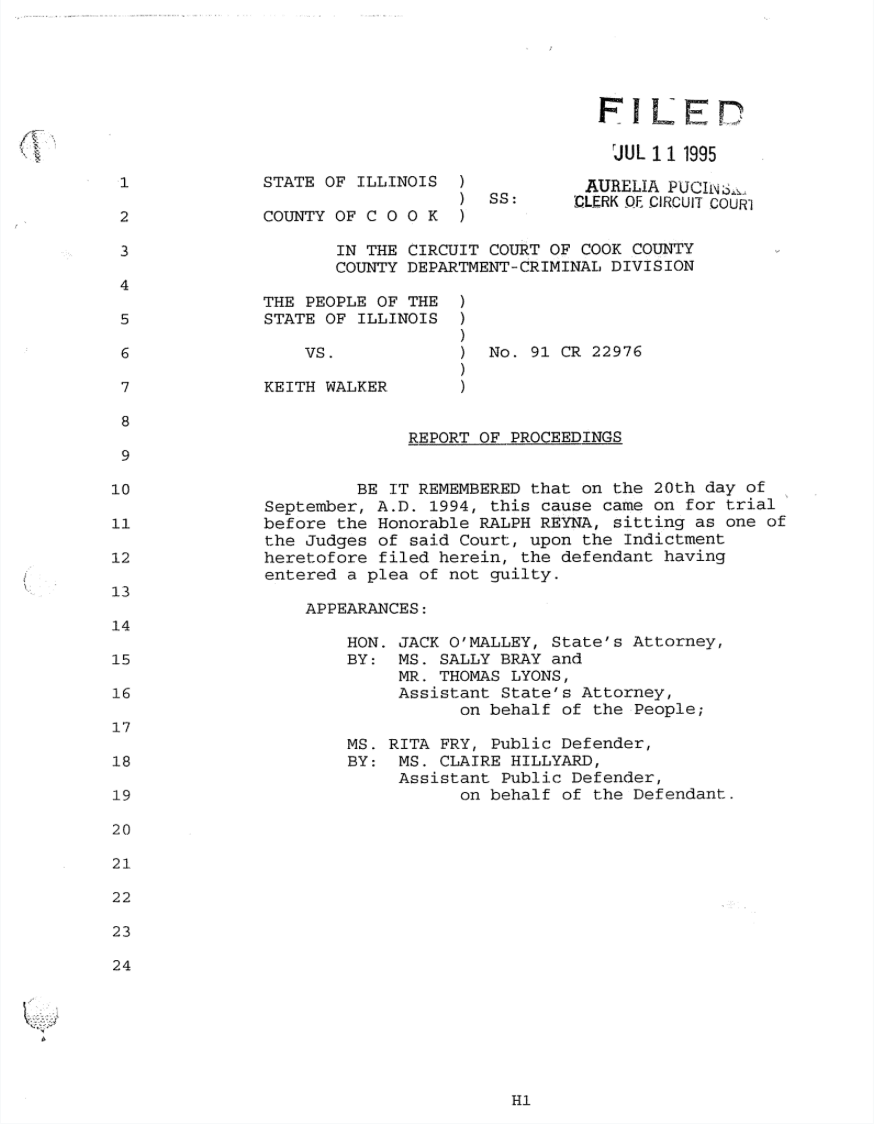The following profile has been published with permission from The National Registry of Exonerations.
On August 13, 2020, more than 25 years after Keith Walker was convicted of murder and attempted armed robbery and sentenced to life in prison without parole, his convictions were vacated and he was released from prison.
His release culminated more than two decades of a legal battle over his claim that he had falsely confessed to a crime he did not commit after he was beaten and given electric shocks by Chicago police. Walker was among more than 100 men who claimed that they were tortured by detectives working under the leadership of Lt. Jon Burge.
The murder of Shawn Wicks
Walker’s ordeal began in the early morning hours of June 3, 1991 when 18-year-old Shawn Wicks was shot four times on the South Side of Chicago after resisting a robbery attempt while he was attempting to purchase marijuana. The shooting received significant media attention because Wicks was a white suburban youth who was shot in a high-crime neighborhood that was largely populated with Black residents.
Wicks died eight days later, after multiple surgeries. Before he died, police said Wicks identified his attackers using hand squeezes and eye blinks.
Wicks lived in Arlington Heights, Illinois, a suburb northwest of Chicago, and was a senior at John Hersey High School. On the night of June 2, Wicks and three friends went to the home of Marcus Bell, who lived on the 5300 block of South Justine Street. Wicks met Bell when Bell played football at Hersey while living in Maryville Academy, an institution for troubled youths. Bell had left the Academy in January 1991 and returned to his neighborhood, but he and Wicks remained friends.
Wicks and his friends smoked marijuana at Bell’s house. Around midnight, Wicks left to buy more marijuana. Two blocks away, he was shot four times while attempting to complete the purchase, police said. When found by police, Wicks had a crumpled $10 bill in his hand. His wallet containing $125 was undisturbed.
Not long after the shooting, Chicago Police Detective Daniel McWeeny, who was the lead detective on the case, said he received a telephone call from a woman who said that people at Bell’s house knew something about the shooting. McWeeny went to the house and found Wicks’s three friends and Bell.
McWeeny said Bell told him that he and Wicks, as well as 23-year-old Keith Walker, who was also at the house, went out to buy marijuana at a corner two blocks away. Bell said that as they were about to make a purchase, a man came up and demanded Wicks’s money. When Wicks refused, the man shot him. Bell said he and Walker fled.
Walker tortured at Area 3
Later that day, McWeeny located Walker and took him to the Area 3 Police Station. What happened there would be in dispute for nearly 30 years.
Walker claimed that detectives kicked and beat him and on four occasions administered electric shocks from a hand-cranked generator to get him to sign a confession admitting that he shot Wicks. This device would later become the centerpiece of allegations of police torture.
The police version was that Bell ultimately said that he saw that Wicks had a roll of money. He said that he and Walker decided that when they went out to buy a $10 bag of marijuana, an accomplice would appear suddenly and demand Wicks’s money. When Wicks resisted, the man shot him.
Detective Louis Caesar later testified that when confronted with Bell’s statement, Walker said that the robbery was Bell’s idea. He said that when they got to the corner, two others, whom he knew only as Shawn and Aki, were there. According to Caesar, Walker said that Aki shot Wicks.
McWeeny determined that Shawn was 17-year-old Tyshawn Ross and Aki was 22-year-old Yusef Trice. When he came back on duty at the police station, he learned that Walker had managed to walk unnoticed out of the police station.
A faulty identification
McWeeny said that on June 5, 1991, two days after the shooting, he took photos of Walker, Ross, Bell and Trice to Cook County hospital where Wicks was conscious, but fighting for his life. Wicks was unable to speak because he was intubated.
McWeeny established a communication system—he would ask questions and Wicks would squeeze McWeeny’s hand once for no and twice for yes. After a few moments, McWeeny had established that there were four people involved and that Wicks did not know the gunman’s name.
McWeeny showed him photo arrays containing color Polaroid photos of Walker, Bell, Trice, and Ross. The photos of the fillers were black and white, which would later come under attack as being suggestive. Wicks indicated that Walker and Bell were involved, he was unsure whether Ross was involved, and that Trice was not involved. Wicks indicated through the hand squeezes that Walker was the gunman.
Not long after, Assistant Cook County State’s Attorney Michelle Simmons arrived and was briefed by McWeeny. Simmons established a different communication system with Wicks, using eye blinks—once for no and twice for yes. Simmons would later testify that Wicks blinked twice at Walker’s photo, indicating that Walker was the gunman.
According to a statement detectives obtained from Ross, Walker grabbed the gun from Trice and shot Wicks. Ross would later assert that his statement was obtained through torture as well.
Walker’s confession
On July 2, 1991, Walker was arrested and was subjected to another round of interrogation. He denied knowing Bell, Ross, or Trice and again denied any involvement in the shooting. However, Walker eventually signed a prepared confession, later saying that he feared further torture if he did not cooperate. That statement was signed after an interview with Nicholas Ford, an assistant state's attorney. According to Ford, Walker admitted being involved in the shooting, and said the gunman was Trice.
Walker, Bell, Ross, and Trice were charged with first-degree murder and attempted armed robbery.
Walker filed a motion to suppress his statement, contending that detectives tortured him. He asserted that his statement signed on July 2 was the result of “fear and dread of renewed and repeated beatings and e[l]ectric box treatment.”
At a hearing on the motion in Cook County Circuit Court, four detectives, including McWeeny, testified. They all denied that Walker was subjected to any physical abuse or torture.
Walker testified that on June 3, 1991, he was placed in a “cage.” Not long after, he was moved to an interrogation room, where officers handcuffed him to a wall and tortured him over the course of two days. Walker described one of these officers as chubby with red hair, a description that fit Jon Burge. This officer kicked, hit, and repeatedly shocked Walker with the device that would become infamous as the “black box.”
Walker testified that a second officer who attached the electric device to Walker was between 30 and 40 years old, with dark blond hair, between 5 feet 9 inches and 6 feet, a little heavy, with no mustache or beard. Walker said he was denied food and access to a bathroom, and was threatened with a gun and the death penalty. He said he was hit with a telephone book. He also said he was not advised of his rights, and his requests for an attorney and a call to his family were ignored. At that time, he refused to sign a confession.
Convicted and sentenced to life in prison
On December 6, 1994, a jury in Cook County Circuit Court convicted Ross of first-degree murder and attempted armed robbery.
That same day, Walker went to trial and chose to have the case decided by Judge Ralph Reyna without a jury. The evidence against him was almost solely based on his confession and the testimony of McWeeny and Simmons about their use of hand squeezes and eye blinks with Wicks. The defense called no witnesses. No physical evidence linked him to the crime.
On December 8, 1994, Judge Reyna convicted Walker of first-degree murder and attempted armed robbery. On December 12, 1994, Bell pled guilty to first-degree murder and attempted armed robbery.
On December 22, 1994, Trice was convicted by a jury of attempted armed robbery. The jury acquitted him of murder.
Walker was sentenced to life in prison without parole. Ross was sentenced to 50 years, Bell was sentenced to 28 years, and Trice was sentenced to 15 years.
The Illinois Appellate Court upheld Walker’s convictions.
Torture allegations mount against Burge and his “Midnight Crew”
Over time, scores of other defendants raised similar claims of torture, including mock executions, electric shocks to genitals from a hand-cranked generator, and beatings. In one case, a suspect suffered burns after he was strapped naked to a radiator until he confessed.
The allegations of torture all focused on Lt. Burge and detectives under his command, who had become known as the “Midnight Crew” because they worked the night shift.
Burge ultimately was fired. In 2010, he was convicted in U.S. District Court in Chicago of perjury for denying torture allegations during questioning in federal lawsuits brought by other torture victims. He was sentenced to 4½ years in prison.
As part of the re-examination of the torture allegations, the Illinois Torture Inquiry and Relief Commission was established to investigate claims of police torture.
Walker’s prolonged fight for freedom
In March 2004, Walker, acting without a lawyer, filed a petition for post-conviction relief alleging several grounds, including actual innocence and the improper admission of his coerced “confession.” The petition was assigned to Cook County Circuit Court Judge Nicholas Ford, who dismissed it without a hearing. Walker appealed. During the appeal, it was discovered that Judge Ford was the prosecutor who took Walker’s alleged confession.
In May 2006, the Illinois Appellate Court reversed the dismissal of the petition and sent it back for appointment of a lawyer for Walker. A different judge again summarily dismissed the petition without appointing a lawyer. Walker appealed, and the case was again sent back to the trial court for appointment of a lawyer.
In December 2008, Walker’s attorney filed an amended post-conviction petition largely based on the torture allegations. In August 2009, Judge Joseph Claps denied the prosecution’s motion to dismiss the case, setting the stage for a hearing.
However, nothing happened. The case stalled because his lawyer became ill. Over the years, as torture was established in other cases, numerous prisoners were released. Some, such as Aaron Patterson, Madison Hobley, Stanley Howard, and Leroy Orange, were pardoned based on actual innocence and released from death row. Others were granted new trials and were released. Others accepted plea agreements for their immediate release. Among these was Ross. Walker refused to take a plea deal for time served and insisted on fighting to prove his innocence. Ross later received reparations from the Torture Inquiry and Relief Commission for the torture he suffered in this case.
As Walker’s case lay dormant, more than 100 decisions were issued by the Torture Inquiry Relief Commission. These, along with rulings by appeals courts, made it clear that numerous officers under Burge’s command, including McWeeny, were implicated in many cases of physical abuse. In some cases, McWeeny was identified as taking on the “good cop” role during the interrogations, or the detective who took statements from defendants after the torture had ended. McWeeny was cited in one report as being involved in the beating of Hobley and playing a role in the torture of Patterson and Howard.
By July 2013, the torture commission said that “McWeeny has been accused in 14 other cases of abuse and coercion of suspects in police custody.”
New agreement and release
In 2019, the Exoneration Project at the University of Chicago Law School took on Walker’s case. In April 2020, project attorneys Lauren Myerscough-Mueller and Sean Starr requested that Illinois Governor J.B. Pritzker grant Walker an immediate release because his health conditions made him particularly vulnerable to COVID-19. In subsequent supplements, they noted that five of the other officers in Walker’s case—Sgt. Jack Byrne and Detectives John Halloran, Jack McCann, Louis Caesar, and Anthony Maslanka—had been implicated in substantiated torture claims in other cases that were “strikingly similar to the allegations made by Mr. Walker and Ross in this matter.”
“Mr. Walker is an innocent man and deserving of mercy,” the lawyers said.
In July 2020, Myerscough-Mueller and Starr met with representatives of the Illinois Attorney General’s Office, including the attorney general, Kwame Raoul. That office took over the prosecution of the case after the Cook County State’s Attorney’s Office was recused. Walker’s lawyers presented the evidence of Walker’s innocence.
On August 13, 2020, lawyers for the attorney general agreed that the convictions should be vacated. Judge Joseph Claps granted a motion to dismiss and Walker was released.
– Written by Maurice Possley





